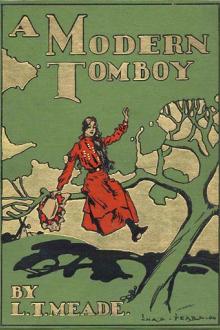The Rebel of the School, L. T. Meade [best historical biographies .txt] 📗

- Author: L. T. Meade
Book online «The Rebel of the School, L. T. Meade [best historical biographies .txt] 📗». Author L. T. Meade
 MRS. L.T. MEADE SERIES
BAD LITTLE HANNAH
LITTLE MOTHER TO OTHERS
A BUNCH OF CHERRIES
MERRY GIRLS OF ENGLAND
CHILDREN'S PILGRIMAGE
MISS NONENTITY
DADDY'S GIRL
A MODERN TOMBOY
DEB AND THE DUCHESS
OUT OF FASHION
FRANCIS KANE'S FORTUNE
PALACE BEAUTIFUL
A GAY CHARMER
POLLY, A NEW-FASHIONED GIRL
A GIRL OF THE PEOPLE
REBELS OF THE SCHOOL
A GIRL IN TEN THOUSAND
SCHOOL FAVORITE
THE GIRLS OF ST. WODES
A SWEET GIRL GRADUATE
GIRLS OF THE TRUE BLUE
THE TIME OF ROSES
GOOD LUCK
A VERY NAUGHTY GIRL
THE HEART OF GOLD
WILD KITTY
THE HONORABLE MISS
WORLD OF GIRLS
LIGHT OF THE MORNING
THE YOUNG MUTINEER
List Price $1.00 Each
CONTENTS.
MRS. L.T. MEADE SERIES
BAD LITTLE HANNAH
LITTLE MOTHER TO OTHERS
A BUNCH OF CHERRIES
MERRY GIRLS OF ENGLAND
CHILDREN'S PILGRIMAGE
MISS NONENTITY
DADDY'S GIRL
A MODERN TOMBOY
DEB AND THE DUCHESS
OUT OF FASHION
FRANCIS KANE'S FORTUNE
PALACE BEAUTIFUL
A GAY CHARMER
POLLY, A NEW-FASHIONED GIRL
A GIRL OF THE PEOPLE
REBELS OF THE SCHOOL
A GIRL IN TEN THOUSAND
SCHOOL FAVORITE
THE GIRLS OF ST. WODES
A SWEET GIRL GRADUATE
GIRLS OF THE TRUE BLUE
THE TIME OF ROSES
GOOD LUCK
A VERY NAUGHTY GIRL
THE HEART OF GOLD
WILD KITTY
THE HONORABLE MISS
WORLD OF GIRLS
LIGHT OF THE MORNING
THE YOUNG MUTINEER
List Price $1.00 Each
CONTENTS.
CHAPTER I. SENT TO COVENTRY!
The school was situated in the suburbs of the popular town of Merrifield, and was known as the Great Shirley School. It had been endowed some hundred years ago by a rich and eccentric individual who bore the name of Charles Shirley, but was now managed by a Board of Governors. By the express order of the founder, the governors were women; and very admirably did they fulfil their trust. There was no recent improvement in education, no better methods, no sanitary requirements which were not introduced into the Great Shirley School. The number of pupils was limited to four hundred, one hundred of which were foundationers and were not required to pay any fees; the remaining three hundred paid small fees in order to be allowed to secure an admirable and up-to-date education under the auspices of the great school.
There came a day in early autumn, shortly after the girls had reassembled after their summer vacation, when they streamed out of the building in groups of twenties and thirties and forties. They stood about and talked as girls will.
The Great Shirley School, well as it was managed, had perhaps a larger share than many schools of those temptations which make school a world—a world for the training either for good or evil of those who go to it. There were the girls who attended the school in the ordinary way, and there were the girls who were drafted on to the foundation from lower schools. These latter were looked down upon by the least noble and the meanest of their fellow-scholars.
There was a slight rain falling, and two or three girls standing in a group raised their umbrellas, but they still stood beside the gates.
"She's quite the very prettiest girl I ever saw," cried Alice Tennant; "but of course we can have nothing to do with her. She entered a week ago. She doesn't pay any of the fees; she has no pretence to being a lady. Oh, here she comes! Did you ever see such a face?"
A slight, shabbily dressed little girl, with her satchel of books slung on her arm, now appeared. She looked to right and left of her as though she were slightly alarmed. Her face was beautiful in the truest sense of the world; it did not at all match with the shabby, faded clothes which she wore. She had large deep-violet eyes, jet-black hair, and a sweet, fresh complexion. Her expression was bewitching, and when she smiled a dimple came in her cheek.
"Look—look!" cried Mary Denny. "Isn't she all that I have said?"
"Yes, and more. What a pity we can't know her!" said Alice Tennant.
"But can't we? I really don't see why we should make the poor child miserable," said Mary Denny.
"It is not to be thought of. We must worship the beautiful new star from afar. Perhaps she will do something to raise herself into our set; but as it is, she must go with Kate Rourke and Hannah Johnson and Clara Sawyer, and all the rest of the foundationers."
"Well, we have seen her now," said Mary, "so I suppose we needn't stand talking about her any longer. Will you come home and have tea with me, Alice? Mother said I might ask you."
"I wish I could come," said Alice; "but we are expecting Kathleen."
"Oh, the Irish girl! Is it really arranged that she is to come?"
"Yes, of course it is. She comes to-night. I have never seen her. We are all pleased, and expect that she will be a very great acquisition."
"Irish girls always are," said Mary. "They're so gay and full of life, and are so ridiculously witty. Don't you remember that time when we had Norah Mahoney at the school? What fun that was!"
"But she got into terrible scrapes, and was practically dismissed," said Alice. "I only hope Kathleen won't be in that style."
"But do you know anything about her? The Irish are always so terribly poor."
"She is not poor at all. She has got an uncle and aunt in Chicago, and they are as rich as can be; and her uncle is coming to see her at Christmas. And besides that, her father has an awfully old castle in the south-west of Ireland. He is never troubled on account of the Land League or anything else, and Kathleen will have lots and lots of money. I know she is paying mother well for giving her a home while she is being educated at the Shirley School."
"I can't imagine why she comes to our school if she is so rich," said Mary. "It seems almost unfair. The Great Shirley School is not meant for rich girls: a girl of the kind you have just described ought not to become a member of the school."
"Oh, that is all very fine; but it seems her mother was educated here, and swore a sort of vow that when Kathleen was old enough she should come to this school and to no other. Her mother's name is Mrs. O'Hara, and she wrote to Miss Ravenscroft and asked if there was a vacancy for Kathleen, and if she knew of any one who would be nice to her and with whom she could live. Miss Ravenscroft thought of mother; she knew that mother would like to have a boarder who would pay her well. So the whole thing was settled; mother has been corresponding with Mrs. O'Hara, and Kathleen comes to-day. I really can't stay another moment, Mary. I must rush home; there are no end of things to be attended to."
"All right," said Mary. "I will watch for you and the beautiful Irish heiress—"
"I don't know that she is an heiress."
"Well, whatever she is—the bewitching Irish girl—to-morrow morning. Ta-ta for the present."
Mary turned to the left, and Alice continued her walk. She walked quickly. She was a well-made, rather pretty girl of fifteen. Her hair, very light in colour, hung down her back. She had a determined walk and a good carriage. As she hurried her steps she saw Ruth Craven, the pretty foundation girl, walking in front of her. Ruth walked slowly and as if she were tired. Once she pressed her hand to her side, and Alice, passing her, hesitated and looked back. The face that met hers was so appealing and loving that she could not resist saying a word.
"Are you awfully tired, Ruth Craven?" she said.
"I shall get used to it," replied Ruth. "I have had a cold for the last few days. Thank you so much, Miss Tennant!"
"Don't thank me," said Alice, frowning; "and don't say 'Miss Tennant,' It isn't good form in our school. I hope you will be better to-morrow. I am sure, at least, that you will like the school very much."
"Thank you," said the girl again.
The girls parted at the next corner. When Ruth found herself alone she paused and looked behind her. Tears rose to her eyes; she took out her handkerchief to wipe them away. She paused as if troubled by some thought; then her face grew bright, and she stepped along more briskly.
"I am a coward, and I ought to be ashamed of myself," she thought. "Now, when I go in and grandfather sees me, he will think he has done quite wrong to let me go to the Shirley School. I must not let him think that. And granny will be still more vexed. I have had my heart's desire, and because things are not quite so pleasant as I hoped they would have been, it is no reason why I should be discontented."
The next moment she had lifted the latch at a small cottage and entered. It was a little better than a workman's house, but not much; there were two rooms downstairs and two rooms upstairs, and that was all. To the front of the little house was the tiny parlour, at the back an equally tiny kitchen. Upstairs was a bedroom for Ruth and a bedroom for her grandparents. Mr. and Mrs. Craven did not keep any servants. The moment Ruth entered now her grandmother put her head out of the kitchen door.
"Ruthie," she said, "the butcher has disappointed us to-day. Here is a shilling; go to the shop and bring in some sausages. Be as quick as you can, child, or your grandfather won't have his supper in time."
Ruth took the money without a word. She went down a small lane, turned to her right, and found herself in a mean little street full of small shops. She entered one that she knew, and asked for a pound and a half of pork sausages. As the woman was wrapping them up in a piece of torn newspaper, she looked at Ruth and said:
"Is it true, Miss Craven, that you are a scholar at the Great Shirley School?"
"I am," replied Ruth. "I went there for the first time to-day."
"So your grandparents are going to educate you, miss, as if you were a lady."
"I am a lady, Mrs. Plowden. My grandparents cannot make me anything but what I am."
Mrs. Plowden smiled. She handed Ruth her sausages without a word, and the young girl left the shop. Her grandmother was waiting for her in the porch.
"What a time you have been, child!" she said. "I do hope this new school and the scholars and all this fuss and excitement of your new life won't turn your head. Whatever happens, you have got to be a little servant to me and a little messenger to





Comments (0)